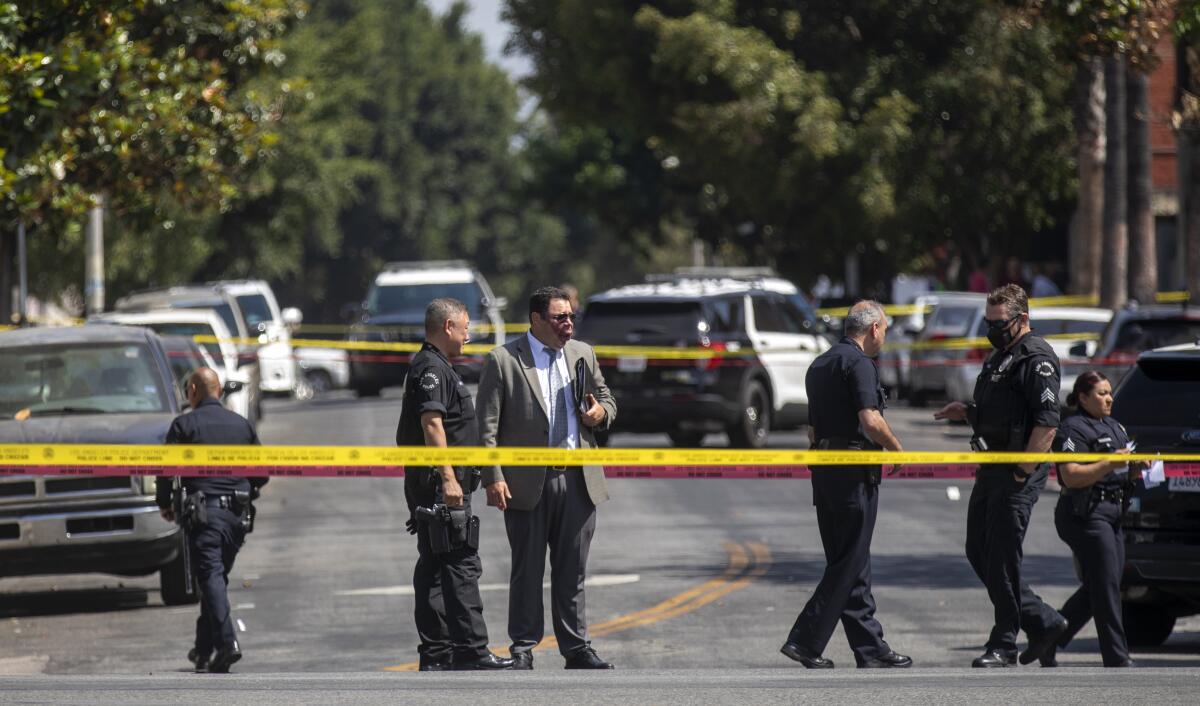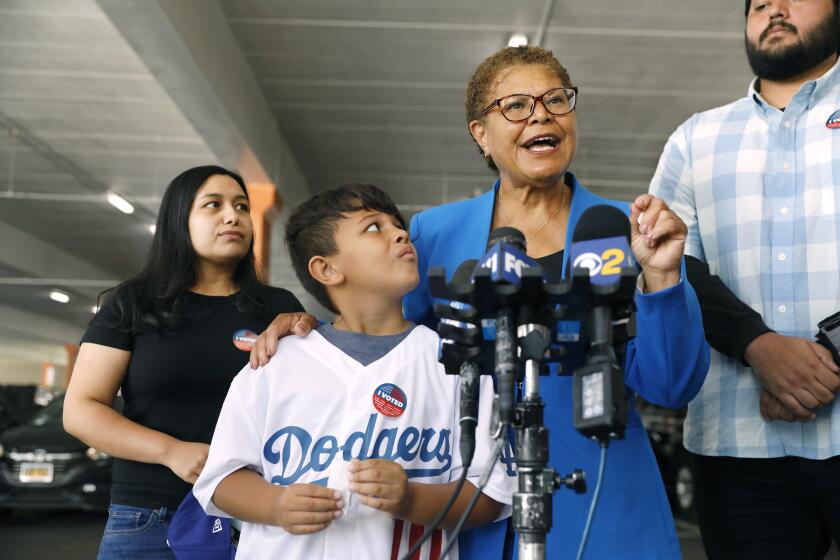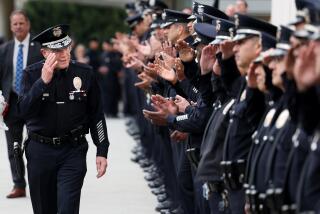Confidence in LAPD drops sharply, poll finds, but L.A. voters don’t want to shrink force

- Share via
Voters in Los Angeles have serious concerns about the Los Angeles Police Department but little interest in shrinking its size amid worries over rising crime, according to a new poll by UC Berkeley and The Times.
Fewer than a third of the city’s registered voters surveyed said they approve of the LAPD’s overall performance — a startling drop from 2009, when a Times poll found 77% of people approved of the department under the leadership of William J. Bratton, an influential chief who oversaw dramatic reforms.
And a majority of respondents believe LAPD officers are tougher on Black residents than other Angelenos. Nearly half said such racial inequities are the result of systemic problems within the department, not just the behavior of individual officers.
Support for the LAPD today is even lower than in 1991, shortly after the beating of Rodney King, when 46% of people polled said they approved of the department.
Bass takes small edge in final pre-primary poll, but neither candidate seems likely to hit the 50% in Tuesday’s primary needed to win outright.
The current poll found 30% of respondents approved of the job the LAPD is doing, 38% disapproved and 32% said they don’t know or don’t have an opinion. Asked about LAPD Chief Michel Moore, 20% approved, 30% disapproved and half said they had no opinion.
However, most voters also see crime as being on the rise, and few said they want a smaller police force, according to the UC Berkeley Institute of Governmental Studies poll of more than 1,200 registered voters, which was co-sponsored by The Times.
In fact, two years after mass protests over police brutality rocked Los Angeles and the nation, giving rise to demands that police budgets and ranks be slashed, the largest share of L.A. voters polled want to see the size of the LAPD increased.
That was true across racial and ethnic groups — though not among voters under 30, which were the only cohort that showed a preference for a reduction in police ranks.
Asked what the next mayor of Los Angeles should do, 47% of those polled said the number of police officers in the city should be increased, and 17% said staffing should be kept as it is.
By comparison, just 15% said the force should be decreased. An additional 20% said they had no opinion.
Increasing the size of the LAPD has been a focus in the mayor’s race and for current city officials. The department, which used to have more than 10,000 officers, now has fewer than 9,400.
Rep. Karen Bass (D-Los Angeles), who along with real estate developer Rick Caruso is a front-runner in the race, has said the force should reach its authorized size of more than 9,700; Caruso has said he wants far more officers than that. City budget analysts have predicted that neither is likely given attrition and recruitment issues.
While many registered voters opposed reducing the police ranks, nearly half of the poll respondents — 49% — also said the city would be better off if it reallocated some police funding to other social services, compared with33% who said it would be worse off.
The figures underscore the “ambivalence and complication in how the public thinks about policing,” said Berkeley political science professor Eric Schickler, co-director of the Institute of Governmental Studies.
The dissonance comes as voters prepare to go to the polls Tuesday for a primary election in which the races for mayor and other offices have been dominated by issues of public safety and homelessness.
More than a third of poll respondents said crime was the most important issue to them.
The polling, however, shows their thoughts on the best path forward are complex.
“You see that in the data. People see crime as increased. There’s some increased anxiety about crime,” Schickler said. “At the same time, in a city like L.A., you see a fair amount of distrust in the LAPD.”
Violent crime has increased sharply in L.A. in recent years. Homicides and shootings are at levels not seen for more than a decade before the COVID-19 pandemic, and robberies and some property crime — including motor vehicle thefts — have surged. Those realities are not lost on voters.
Of those polled, 40% said crime has increased a lot in the city over the last two years, and 25% said it has increased somewhat. Another 18% said it has remained about the same. Just 2% said it had decreased.
According to the poll, voters who plan to vote for Caruso are far more concerned about crime — and far more supportive of more police — than those backing more progressive candidates like Bass.
With Los Angeles suffering from a surge in homicides and high-profile robberies, public safety and crime are at the forefront of the city’s mayoral contest.
Interviews by The Times reflected similar nuance in how residents feel about police and safety.
Maria Camacho, a 58-year-old Latina from South L.A., said she believes the LAPD is poorly trained, under poor leadership and focused on the wrong things.
“They act when they don’t need to, and when they should, they don’t,” she said.
Full question wording and topline results
Still, the uptick in crime has made her feel unsafe — thieves have broken into her yard and stolen things — and she supports adding more officers and resources to the LAPD, she said.
Sharron Green, 35, also of South L.A., said she mostly feels safe in her neighborhood, where people know her and her family and don’t mess with them.
More frightening, she said, is the possibility of encountering police, who she said have been unfair and dismissive to her family in the past because they are Black and from a low-income neighborhood.
“It does not make me more safe when cops are around with a Black husband and three Black sons,” Green said. “I really just feel uneasy.”
Because of those concerns, Green said she is against adding more cops to the streets. But she also doesn’t support reducing funding for the police, she said, saying more oversight and more diversity among the rank and file are needed instead.
The LAPD’s force largely mirrors city demographics, with Latinos representing the largest cohort of officers.
Carol Katona, 80, who is white and has lived in Venice since the 1970s, said she has felt decidedly less safe in the last few years.
“It’s a crime what the politicians have allowed in Venice,” she said. “People are afraid. I don’t like to go anywhere at night.”
Katona attributes the crime to homelessness and mental health problems, but also poor leadership by local politicians, prosecutors and police officials — who she thinks have sent a signal to officers not to enforce the laws.
She would like for there to be more social and mental health services for homeless people, but not at the expense of the LAPD, she said.
“I wish we had police that walked the streets and got to know people and kept an eye on things,” Katona said.
The poll was conducted May 24-31 online in English and Spanish among 1,204 registered voters in the city of L.A. The margin of error is 3 percentage points.
There are limits to polling registered voters. While they elect the people who set the LAPD’s budget, size and policy, they don’t include everyone affected by those things, including noncitizen immigrants.
In 2009, a third of L.A. voters said the LAPD treated all racial groups the same way. That fell to just 15% in the latest poll. The share who said LAPD officers are tougher on Black residents, meanwhile, rose from a third in 2009 to more than half now. The share who said the LAPD is tougher on Latino residents also went up, from 16% to 24%.
Among voters who want to see the size of the force decreased, there was almost universal agreement that the LAPD treats Black residents unfairly. But even among those who want to see the LAPD increased, a plurality of about 4 in 10 think the LAPD is tougher on Black residents.
Asked if police make them feel mostly safe or mostly anxious, 41% of poll respondents said mostly safe and 36% said mostly anxious. Black and Latino voters were more likely to say the police made them feel mostly anxious — at 43% and 45%, respectively.
About two-thirds of voters who are immigrants want to see the size of the force increased.
Dorly Francisco, 34, an immigrant from Guatemala who can’t vote but pays taxes, said crime has been on the rise in her South L.A. neighborhood, yet police aren’t around. “They’re not doing anything,” she said.
She wants more police who are better trained and who show less discrimination toward Latinos and other residents, she said. And given the wealth in this country, she said, she doesn’t understand why L.A. can’t provide good policing and robust social services at the same time.
Poll respondents were also asked about other public safety issues — including a newly implemented LAPD policy barring police from using minor traffic infractions as an excuse to investigate motorists and others for more serious crimes, unless the violation significantly interferes with public safety or the police have prior information about the suspect that justifies the stop.
The policy follows years of complaints from residents of color that LAPD officers had disproportionately and unjustly used minor traffic stops to harass and search people in predominantly Black and Latino neighborhoods.
More than 40% of respondents said the new policy limiting such stops struck the right balance, while 24% said it doesn’t go far enough to protect the rights of residents. Only 15% said the policy went too far in restraining officers, with an additional 20% saying they had no opinion.
Beyond the city, the poll also asked voters statewide about their perceptions of crime.
Even more statewide voters than city voters see crime as being on the rise, with 75% of statewide respondents saying crime has increased over the last two years compared with 65% of city voters.
Times senior editor David Lauter contributed to this report.
More to Read
Sign up for Essential California
The most important California stories and recommendations in your inbox every morning.
You may occasionally receive promotional content from the Los Angeles Times.













